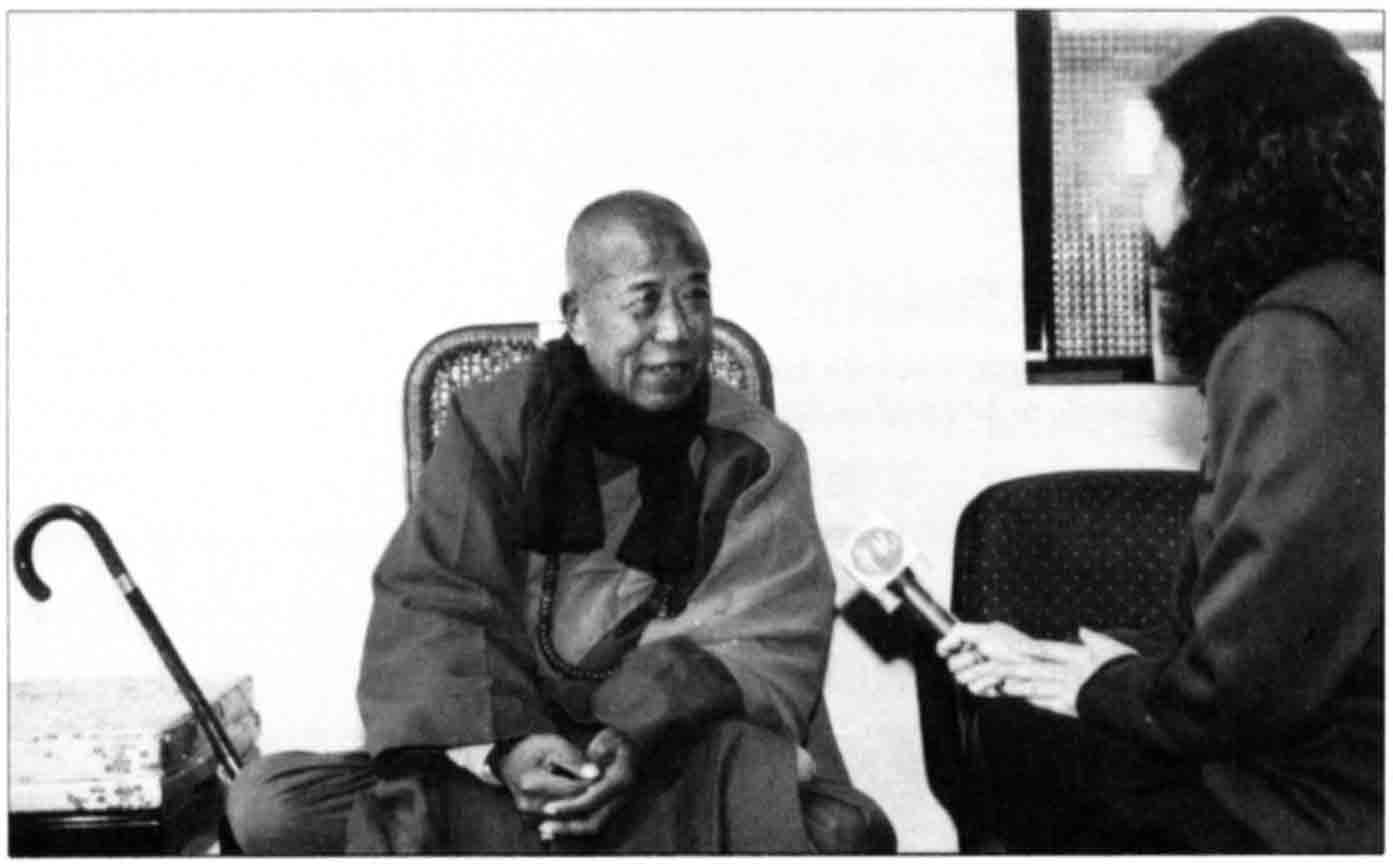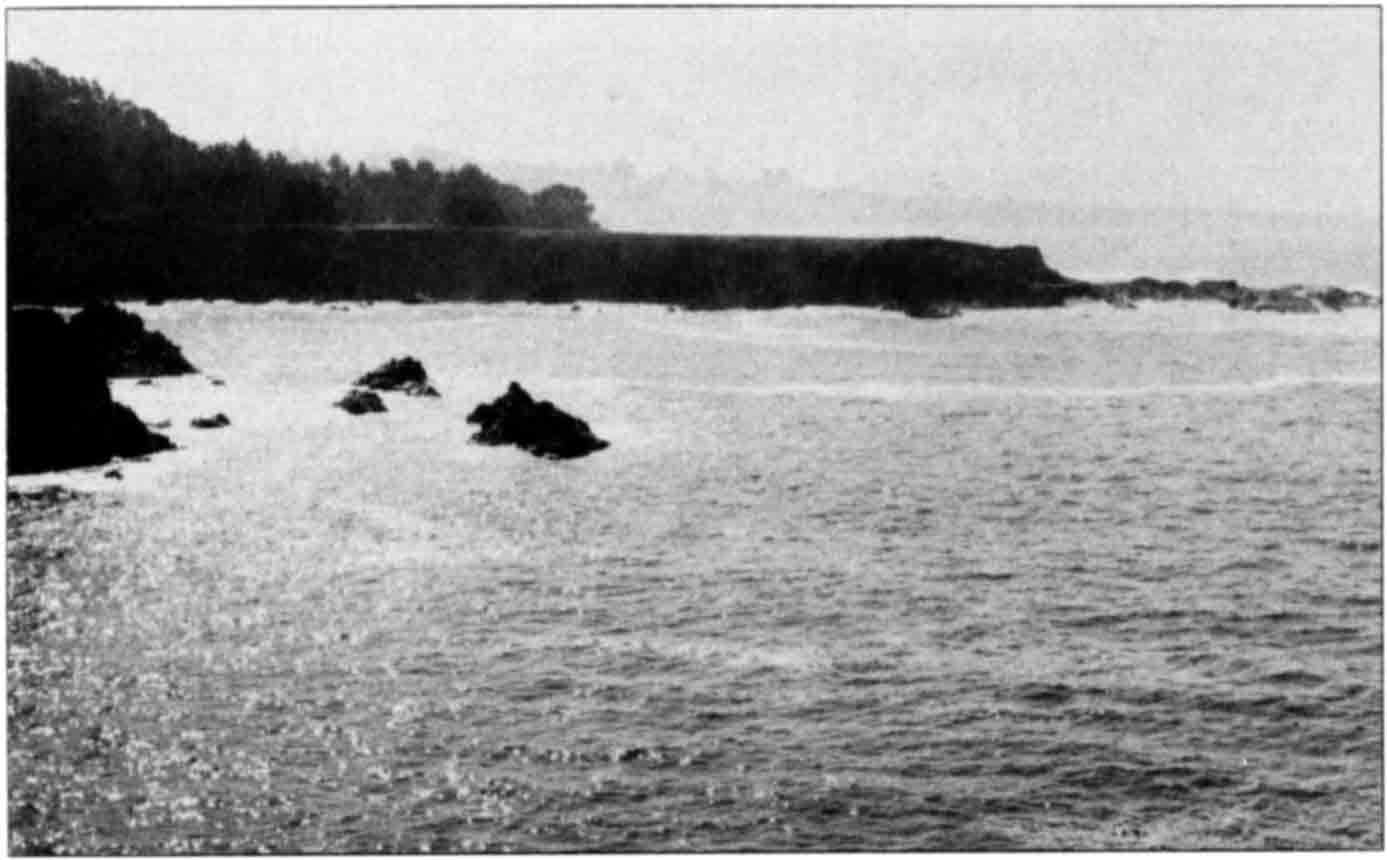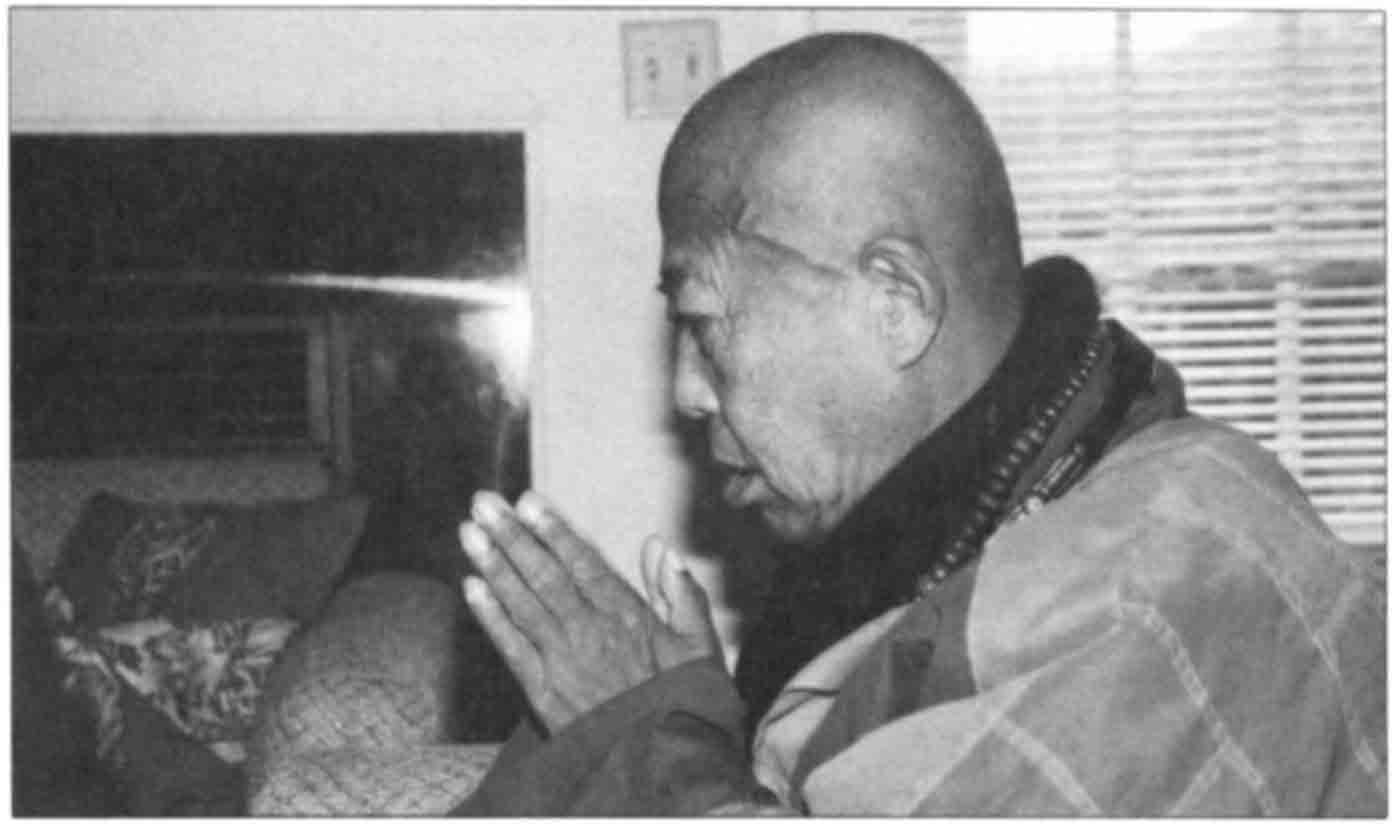|
·上人只知道有其他人,不知道有自己。
·上人剛來美國舊金山中國城做墓中僧時,有時去垃圾桶撿菜吃,也從不覺
得它有什麼不好。上人曾說:修道人不要吃得太好,吃得太好就不會修道了。
·上人慈悲為懷,遠離八萬四千里外眾生們的悲聲、哀聲、苦聲、怨聲、嘆
聲……,甚至於一掉眼淚,上人皆無所不知,無所不曉,聞聲救苦。
·上人曾言:「我在舊金山一天,就不准舊金山地震!」而一九八九年舊金
山大地震時,上人正在臺灣為護國息災舉行法會,馬不停蹄(其時上人禁食)。上人關懷災區眾生心切,地震發生後,立即返美,第三天又飛回臺灣,繼續為護國護
民流血汗。
·十幾年來,風雨無阻,不論天氣再炎熱,上人每月一次,從舊金山南下洛
杉磯金輪寺弘法。那時師父乘坐的車子,又破又舊,又沒有冷氣。一路辛苦,路上連水也不喝,衲袍都汗濕透了,但是上人從無怨言。中途經過Coalinga
(屠宰牛的地方)時,上人還專門下車,遠遠面對著這一群將被宰殺的數千隻牛的方向,唸唸有詞,慈悲地度牠們離苦得樂。
直到加拿大金佛寺成立後半年左右,上人才改為每隔一個月去洛杉磯一次。
金佛寺成立之後,為了節省機票開支,上人也是坐車十八小時先至西雅圖,次日再坐三小時車到加拿大溫哥華,弘法數日後,又坐車回萬佛城。一路上來回,上人除
了吃午餐之外,連水都不喝,非常辛苦,上人就是這樣地奔波於萬佛聖城與各個道場之間。

◆上人分分秒秒不辭辛勞,各處奔波,為法忘軀。
The Venerable Master toiled every minute and second, travelling from
place to place, forgetting himself for the sake of the Dharma.
·上人分分秒秒不辭辛勞,各處奔波,為法忘軀。我多年來常見到上人旅途
十幾個小時,連水都不喝。每到一處,一進道場,通常會有法師頂禮後,即刻向上人呈報各項事務,有時連續一、二小時,或數小時之久,還有處理不完的公事、私
事要馬上解決。上人連吃飯都沒有時間,更談不上休息,但也從未見過上人叫苦,他老人家一向任勞任怨,以身作則,不把自己的身體當一回事,每天就這樣流血流
汗。
·上人常常對我們說,不要把光陰空過了。在旅途上無論多辛苦、多遙遠,
第二天上人總是一大早,有時早上兩、三點已開始在做事了。
·上人不論去哪裡,無論是萬佛城裡或到遠地,從來未向居士開過口,要城
外的人替他開車。
·今年四月間(一九九五年)我有機會去朝上人在香港大嶼山的道場––慈
興寺。從香港坐船一小時,下船後還要坐巴士一小時,然後再爬山一小時,才到了隱藏在深山裡,渺無人煙的慈興禪寺。想起當年上人為了建寺,為了工人的口糧,
要坐船到香港去買米,然後背著沉重的米袋,沿著陡斜的山坡回到寺裡。今天在寺廟,當年上人是如何艱辛的蹤跡,仍可四處看到。不免心酸,感慨萬千!
·上人不單為世界和平絕食,也常因為弟子們剛強難調,發脾氣,起爭論而
不吃飯。自己責怪自己沒有德行,沒有把弟子們教好。
·法總每個道場的家風是法輪常轉,不論人多人寡,甚至沒有人聽經,也每
天講經;一天不講經,就一天不吃飯。上人講法深入淺出,一針見血,因人說法,善巧方便,智慧如海,弟子們在師父開示後都說:「今天師父講的是我!」師父講
法生動幽默,故弟子們聞法都不會打瞌睡。
·上人苦口婆心,經常耳提面命,教弟子們,「不要自暴自棄,人人皆可成
堯舜!」
·在道場,上人規矩嚴格,教導弟子們時時刻刻要專一其心,努力辦道,眼
睛不東張西望,口:不寒暄、閒聊,不說雜話、廢話,以免空過光陰,意:不向任何人攀緣,溜虛拍馬,以免障道。
·上人講解《祖師傳》時,常常勉勵我們要逆潮流而行,做疾風中的勁燭,
做一個頂天立地、出乎其類、拔乎其萃的人。從哪裡下手?就在行住坐臥,吃飯、穿衣、睡覺上用功。
·上人是嚴師慈父,外表雖然很嚴肅,內心卻慈祥溫暖,對弟子們有無限的
關懷,默默地照顧每一個人。
·令上人最不快樂的事,是弟子們發脾氣。
·有一天晚上,在聖城妙語堂講經時,沒有一個出家人願意上臺先講。講經
結束後,從妙語堂回佛殿時,上人是跪著看大眾出門的,他嚴厲責罰自己,行無言之教。我不知當時有多少人知道師父的用心良苦。
·上人有大智慧,處理一切事務不須思索,問題皆迎刃而解。
·上人有驚人的記憶,根據周果立居士回想一九七○年代,上人講解《華嚴
經》長達九年,可以不用看經書,朗朗背誦經文,一字不漏。
·上人是我見過最自在的人,真正做到掃一切法,離一切相,沒有一切執
著。不像我們凡夫念念不忘我做了什麼,我某年某月供養了什麼,我……,我……,我……。

◆上人的境界是《華嚴經》的境界。
The Venerable Master state was the state of theFlower Adornment Sutra.
·上人的境界不可心思,不可言議,寫再多也無法講完,無法真正表達上人
的大慈、大悲、大喜、大捨、大勇、大智、大願、大行、大力……。上人的境界是《華嚴經》的境界,唯有常靜心讀誦《華嚴經》,才能認識我們偉大的師父。在末
法時代,能遇到上人,常常親近上人,是我此生最最幸福的一件事。
|
|
·The Venerable Master knew only
that there were others; he didn’t know that he had a self.
·When the Venerable Master was
being a “monk in the grave” in San Francisco’s Chinatown after he had
just come to America, he would sometimes go to the garbage dump and
take out vegetables to eat. He didn’t feel there was anything bad about
it. The Venerable Master said, “Cultivators shouldn’t eat too well. If
they eat too well, they won’t cultivate.”
·The Venerable Master has a
compassionate heart. He completely knows and perceives the sounds of
sadness, sounds of grief, sounds of suffering, sounds of resentment,
sounds of sighing...even the shedding of a single tear of living
beings, and even when they are more than 84,000 miles away. The
Venerable Master hears their sounds and rescues them from suffering.
·The Venerable Master said, “As
long as I am in San Francisco, I will not allow San Francisco to have
an earthquake!” When a major earthquake occurred in San Francisco in
1989, the Venerable Master was in Taiwan, toiling nonstop to hold a
Dharma Session for Protecting the Nation and Quelling Disasters (he was
also undertaking a complete fast at the time). The Venerable Master was
very concerned about the living beings in the earthquake zone, so he
immediately returned to America. Three days later, he flew back to
Taiwan to continue giving his blood and sweat to protect the nation and
its people.
·For more than ten years,
regardless of the wind, rain, or hot weather, the Venerable Master
would travel once a month from San Francisco to Gold Wheel Monastery in
Los Angeles to propagate the Dharma. The car that the Venerable Master
rode in was battered, old, and had no air conditioning. Although his
robes would be soaked with sweat after the uncomfortable journey, he
never once complained. When they passed through Coalinga (where cows
were slaughtered), the Venerable Master would get out of the car, face
the several thousand cows who were doomed to be slaughtered, and recite
for them, compassionately saving them and enabling them to leave
suffering and attain bliss.
About half a year after Gold Buddha Monastery was founded in Canada,
the Venerable Master started going to Los Angeles only every other
month. After Gold Buddha Monastery opened, in order to save the money
it would have cost to buy a plane ticket, the Venerable Master would
travel by car for eighteen hours to Seattle, and then ride for three
more hours the following day to reach Vancouver. After propagating the
Dharma there for several days, he would then travel by car back to the
City of Ten Thousand Buddhas. During those trips, except during his one
meal at midday, the Master didn’t even drink water. It was very
difficult. That was how he travelled between the Sagely City of Ten
Thousand Buddhas and the various Way-places, undergoing great suffering
and hardship.
·The Venerable Master toiled
every minute and second, travelling from place to place, forgetting
himself for the sake of the Dharma. Over the years, I have seen the
Venerable Master travel for over ten hours without even taking a drink
of water. Wherever he went, as soon as he arrived at the Way-place, the
Dharma Masters there would bow to him and then immediately report to
him on various matters. Sometimes this would go on for several hours,
and there would still be endless temple matters and personal problems
that required his immediate attention. The Venerable Master didn’t even
have time to eat, much less to take a rest. Yet I never saw the Master
complain once. He always bore the toil and the complaints, setting an
example with his own conduct. He didn’t pay any heed to his body. Every
day he exhausted himself like this.
·The Venerable Master often
reminded us not to let our time go to waste. No matter how exhausting
or long the journey was, the Venerable Master would always rise early
the next morning. Sometimes he would start working at two or three
o’clock in the morning.
·No matter where the Venerable
Master was, whether he was in the City of Ten Thousand Buddhas or
somewhere far away, he would never ask a layperson who lived outside
the City to drive him somewhere.
·In April of this year (1995), I
had an opportunity to visit Cixing Monastery—the Venerable Master’s
Way-place at Lanto Island in Hong Kong. From Hong Kong, I rode on the
ferry for one hour, then took a one-hour bus ride, and finally climbed
the mountain for an hour, before reaching Cixing Chan Monastery hidden
deep in the mountains, where no trace of human dwellings could be seen.
I think back to the time when the Venerable Master was constructing the
monastery. For the sake of feeding the workers, he would take the ferry
to Hong Kong to buy rice and then carry the heavy bags of rice over his
shoulder and walk back up the steep slopes to the monastery. The
Venerable Master’s laborious pains can still be seen all about the
monastery today. I cannot help feeling grieved and deeply moved!
·The Venerable Master not only
fasted for world peace, he frequently also refused to eat when his
disciples were stubborn and disobedient, lost their tempers, or got
into arguments. He would blame himself for lacking virtue and failing
to teach his disciples well.

◆上人外表雖然很
嚴肅,內心卻慈祥
溫暖,默默地照顧每一個人。
Although the Venerable Master appeared stern, his heart was gentle and
warm. He silently took care of every person.
·Each of the Way-places of the
Dharma Realm Buddhist Association is characterized by the constant
turning of the Dharma wheel. Whether there are many people or few—even
if there aren’t any—lectures on the Sutras are held every day. If there
is one day the Sutras are not lectured, that day people should go
without eating. When the Venerable Master spoke the Dharma, he
penetrated it deeply yet expressed it in very simple words. His words
were straight to the point. He employed skillful expedients and had
ocean-like wisdom. After listening to the Venerable Master’s talks,
each disciple would say, “Today the Venerable Master was talking about
me!” The Venerable Master spoke the Dharma in such a lively and
humorous way that his disciples were never able to doze off during his
talks.
·The Venerable Master
remonstrated earnestly with his disciples, giving instructions in their
ear or telling them to their face, teaching them, “Don’t give up on
yourself! Everyone can become like (the sage-emperors) Yao and Shun!”
·In the Way-place, the Venerable
Master set up strict rules and taught his disciples to concentrate
single-mindedly at all times and diligently cultivate. One’s eyes
should not look around at random. One’s mouth should not indulge in
meaningless conversation, idle chatter, or irrelevant talk, as these
are a waste of time. In order to avoid obstructing the Way, one’s mind
should not try to exploit conditions or curry favor from anyone.
·When the Venerable Master
explained the Lives of the Patriarchs, he frequently exhorted us to go
against the mainstream, to be brave candles in a strong gale, heroes,
and outstanding people. Where should we begin? By applying effort while
we are walking, standing, sitting, and lying down; while we are eating,
wearing clothes, and sleeping.
·The Venerable Master was both a strict teacher and a kindly father.
Although he appeared stern, his heart was gentle and warm. He cared
infinitely for his disciples and silently took care of every person.
·What upset the Venerable Master
most was to see his disciples lose their tempers.
·One night, during a Sutra
lecture in Wonderful Words Hall, not a single left-home person was
willing to go up to the podium and lecture. After the lecture was over
and people were leaving Wonderful Words Hall to return to the
Buddhahall, the Venerable Master knelt down by the doorway and watched
the assembly walk out, reproaching himself sternly, bestowing a
wordless teaching. I don’t know how many people realized what great
lengths the Venerable Master had gone to.
·The Venerable Master had great
wisdom and handled all matters without conscious deliberation,
resolving all problems at once.
·The Venerable Master’s memory
power was astounding. As Layman Zhou Guoli recalls, during the nine
years that the Venerable Master explained the Flower Adornment Sutra in
the 1970’s, he was able to recite the text in a clear voice, without
missing a single word and without looking at the book.
·The Venerable Master was the
most carefree person I have ever met. He was truly able to “sweep away
all dharmas and separate from all marks.” He didn’t have any attachment
at all, unlike us ordinary people, whose every thought is about: “What
I have done, what offering I made in a certain month of a certain year,
what I..., I..., I...”
·The Venerable Master’s state
was inconceivable and ineffable. No matter how much I write, I will
never be able to finish. It’s impossible to truly express the Venerable
Master’s great kindness, great compassion, great joy, great
renunciation, great courage, great wisdom, great conduct, great
strength... The Venerable Master’s state was the Flower Adornment
State. Only through constant reading of the Flower Adornment Sutra with
a calm mind will we be able to recognize our extraordinary teacher. The
most fortunate thing in my life is that I have been able to encounter
the Venerable Master and frequently draw near to the Venerable Master
in this Dharma-ending Age.
|